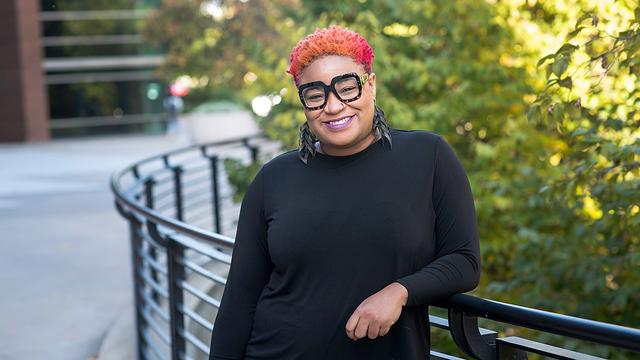How can communities better plan for and recover from disasters? This is the question that drives the newest faculty member at the Humphrey School of Public Affairs, Fayola Jacobs. Jacobs, who describes herself as a Black feminist urban planner, joins the School’s urban and regional planning program after serving as a postdoctoral associate on the CREATE Initiative, a research project focused on the intersection of water and equity.
Jacobs’ passion is disasters—and how structural forms of oppression, such as racism, influence communities' ability to plan for, cope with, and recover from disasters. She was raised on the Caribbean island of St. Kitts, where disasters such as hurricanes, earthquakes, and volcano eruptions are common.
“Disasters shaped my experiences growing up,” says Jacobs, recalling that classes had to be cancelled when storms blew the roof off her school building, and some of her classmates moved there from a neighboring island, Montserrat, after a volcano eruption destroyed their homes.
Jacobs was “bitten by the disaster bug” as a master’s degree student at the University of North Carolina–Chapel Hill, when she took a course on disaster management and response.
Her work combines urban planning, hazard and disaster research, environmental justice, and Black feminist theories to examine the reasons for the inequities in natural disaster planning.
“Disasters are such important moments of reflection. They clear away all the dust and rubble, so you can see what’s been happening all along,” she says. “Why are poor communities hit so much harder? Why are people of color experiencing worse damage during hurricanes and other disasters? These are useful moments, not only for making clear all the issues that have always existed, but providing an opportunity to make improvements in planning and response systems.”
“We’re so pleased to welcome Fayola Jacobs to the Humphrey School faculty this fall,” Dean Laura Bloomberg says. “She brings to our urban and regional planning program a wealth of research and teaching expertise in environmental planning and justice, environmental hazard mitigation, and urban analytical methods. Her contributions to our curriculum and research priorities will be substantial.”
Jacobs says she is excited to be at the Humphrey School, with its emphasis on engaging with the community and training the next generation of leaders.
"I am committed to working for and with communities to understand the connections between racism and vulnerability to disasters and climate change, and to find ways for us to use the resources of this amazing school and university to create more just and sustainable environmental futures for all,” Jacobs says.
“I’m passionate about social justice and interested in working with students who have nontraditional experiences,” she adds. “Here, they are excited about who I am and about the ways they can support me as I grow. I feel richly blessed.”
Jacobs holds a PhD in urban and regional sciences at Texas A&M University, and earned her master’s degree in city and regional planning at the University of North Carolina–Chapel Hill.


